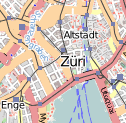DE:Switzerland/Deutschschweizer Dialektkarte
Jump to navigation
Jump to search


Figur: Deutschschweizer Dialektkarte (Quelle: [1]).
Deutschschweizer Dialektkarte ("Dütschschwiizer Dialäkt-Chartä") auf der Basis von OpenStreetMap-Daten.
Über...
Diese Karte wurde Dank eines Tools von User:MaZderMind auf dem Toolserver mit OpenStreetMap-Daten erstellt. Sie wertet Deutschschweizer Namen aus, die wie folgt erfasst wurden name:gsw=<Name im Deutschschweizer Dialekt> also z.B. name:gsw=Wolfhuse.
Helft mit, diese Karte zu vervollständigen!
Beispielkarte
Hier ein >>> Ausschnitt rund um Zürich, wo grosse Ortsnamen bereits erfasst sind (wie zum Beispiel Agisul, Bopplisse, Tiinert, Glaprugg, Mäpmischtette, Söizi, etc.).
Was bedeutet der Code 'gsw'?
'gsw' ist ein ISO-Sprachcode (vgl. ISO 639-3 und steht für 'German SWiss'. Mehr dazu auf Multilingual_names#Switzerland (zu 'gsw' siehe auch [2], [3]).
- Actually no, it is the code for Alemanic as the whole, i.e. including the 3 dialectal variants spoken
- in Northen and Eastern Switzerland [gsw-ch] (too frequently named "German Swiss", or Schwyzerdütsch / Schwytzertuetsch in Swiss Alemanic which is a better term, but still distinct from [de-ch] for standard spoken German with the Swiss orthographic variant self named "Schweizer Deutsch"), also spoken by a very tiny minority in Liechstenstein (and some former minorities in the Czech Republic), or
- in Eastern France [gsw-fr] (named "Alsatian", or Alsacien in French, Elsaessisch natively), also spoken by a very tiny minority in Andorra [gsw-ad] (possibly already extinct? brought there by native Alsatian people coming to work in the local mining industry), or
- in Southern Germany [gsw-de] (generally named "Alemanic" or (Hoch) Alemannisch in German, or (Hoch) Dütsch natively), also spoken by a very tiny minority in Western Austria (with unclear distinction with the Swiss variant) with some borrows from Bavarian [bar] and Schwäbian [swg].
- The three dialectal variants of Alemanic still have no distinctive variant ISO 639-3 codes as individual languages: [gsw] (reference) is still an "individual language" not a "macrolanguage" in ISO 639 terminology (but it would be changed to a "macrolanguage" if the three variants were separately encoded as "individual languages" (such as [als] for Alsatian, which is the non-standard code still used in Wikipedia to refer to the 3 Alemanic variants instead of the standard [gsw] code). For this reason, when one wants to distinguish them, the [gsw] code has to be suffixed by a region subtag (conforming with the BCP 47 standard) — Verdy_p (talk) 22:41, 10 May 2017 (UTC)
- Note: the "Schwyzerdütsch" variant [gsw-ch] includes itself many varieties; Bern (Bärndütsch), Zurich, Lucerne, Basel, Obwald, Appenzell, Saint Gallen, Graubuenden-Grisons (Valserisch), Wallis (Wallisch).
- Most Swiss varieties are "High Alemannisch" and "Highest Alemannisch" (several in central Switzerland). Each canton has a separate variety. Only a few of 20–70 varieties are listed as dialects. Reportedly most similar to Schwäbian [swg] in south central Germany. Not inherently intelligible with Standard German [de]=[deu].
- The Ethnologue and The Linguist List have more detailed info.
- See also this list of resources (most of them related to the Alsatian variant in Eastern France). — Verdy_p (talk) 23:03, 10 May 2017 (UTC)
Weitere Infos
- de:Switzerland/Map Features
- Schweizerdeutsche Schreibung insbesondere für Orts- und Siedlungsnamen, d.h. um Städte, Dörfer und Weiler.